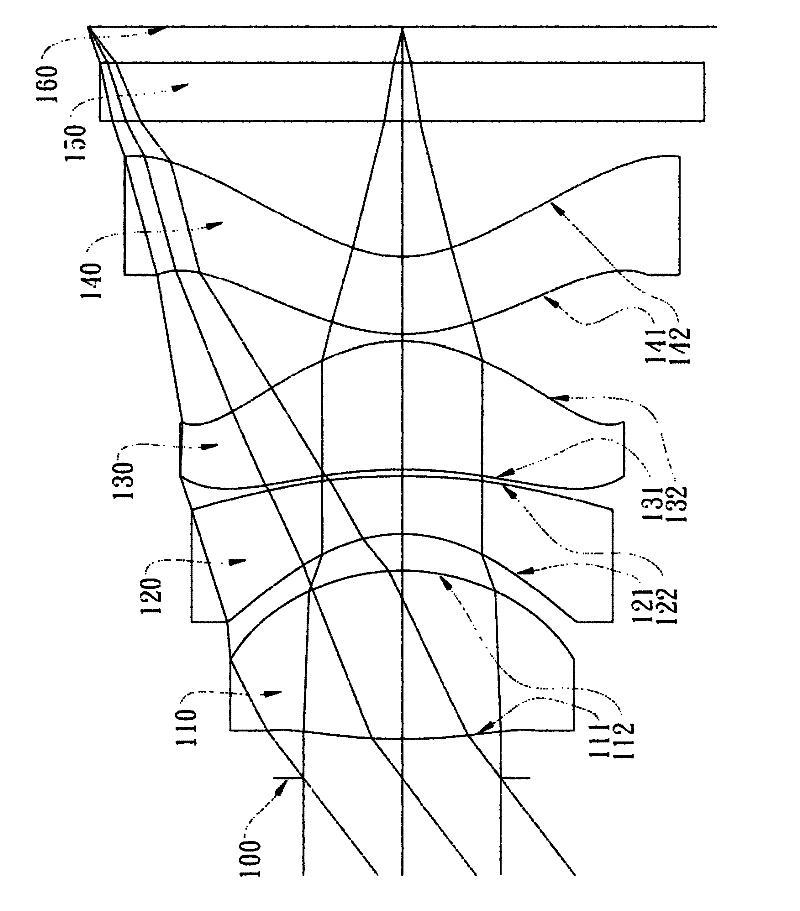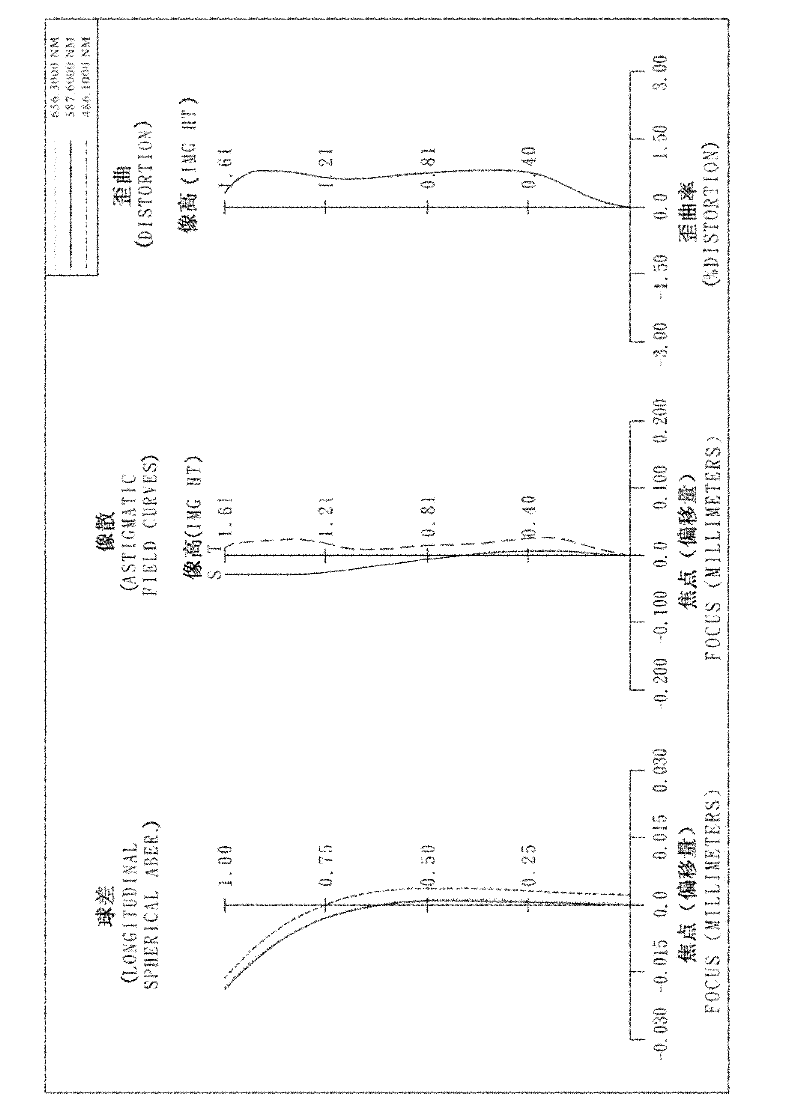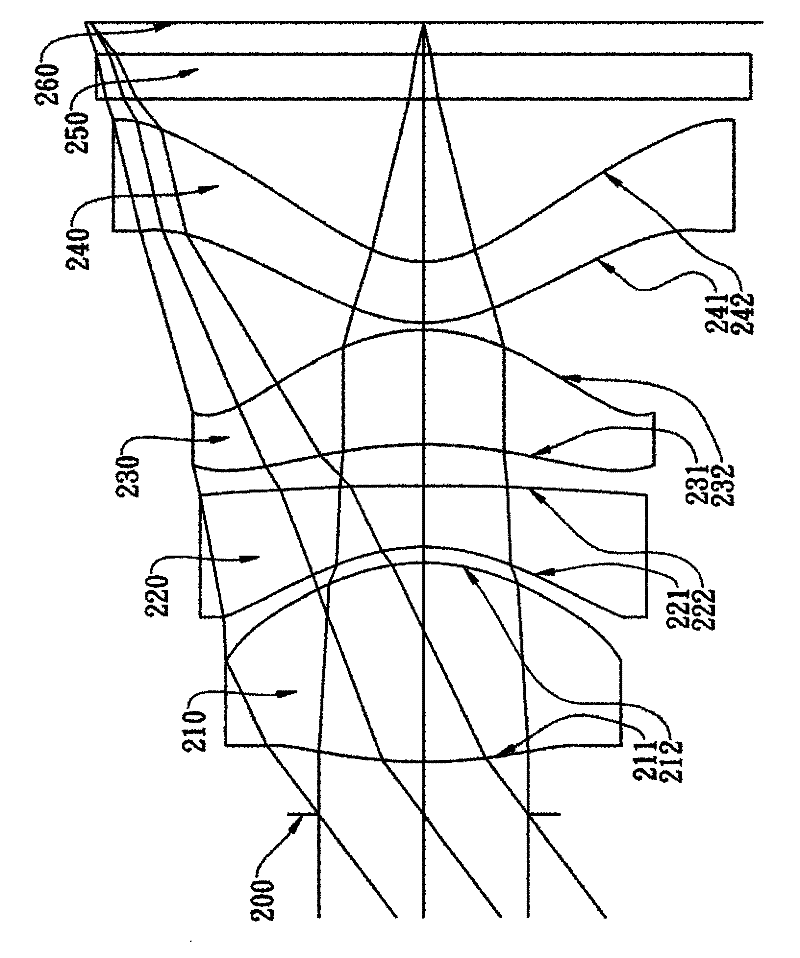Image pick-up optical lens assembly
An optical lens and lens technology, applied in optics, optical components, instruments, etc., can solve the problems of difficult manufacturing, insufficient system freedom, and difficult glass lens bonding process, and achieve high resolution, reduce the size of the lens, and reduce the size of the system. effect of sensitivity
- Summary
- Abstract
- Description
- Claims
- Application Information
AI Technical Summary
Problems solved by technology
Method used
Image
Examples
no. 1 example
[0080] Please refer to the first embodiment of the present invention Figure 1A , for the aberration curve of the first embodiment, please refer to Figure 1B . The image-taking optical lens group of the first embodiment is mainly composed of four lenses, which include sequentially from the object side to the image side:
[0081] A first lens 110 with positive refractive power, its object-side surface 111 and image-side surface 112 are both convex, and its material is plastic;
[0082] A second lens 120 with negative refractive power, the object-side surface 121 is concave and the image-side surface 122 is convex, and its material is plastic;
[0083] A third lens 130 with positive refractive power, its object-side surface 131 is concave and image-side surface 132 is convex, its material is plastic, and the object-side surface 131 and image-side surface 132 of the third lens 130 are non- spherical; and
[0084] A fourth lens 140 with negative refractive power, its object-si...
no. 2 example
[0112] Please refer to the second embodiment of the present invention Figure 2A , for the aberration curve of the second embodiment, please refer to Figure 2B . The image-taking optical lens group of the second embodiment is mainly composed of four lenses, which include sequentially from the object side to the image side:
[0113] A first lens 210 with positive refractive power, its object-side surface 211 and image-side surface 212 are both convex, and its material is plastic;
[0114] A second lens 220 with negative refractive power, the object side surface 221 is concave and the image side surface 222 is convex, and its material is plastic;
[0115] A third lens 230 with positive refractive power, its object-side surface 231 is concave and image-side surface 232 is convex, its material is plastic, and the object-side surface 231 and image-side surface 232 of the third lens 230 are non- spherical; and
[0116] A fourth lens 240 with negative refractive power, its objec...
no. 3 example
[0138] Please refer to the third embodiment of the present invention Figure 3A , for the aberration curve of the third embodiment, please refer to Figure 3B . The image-taking optical lens group of the third embodiment is mainly composed of four lenses, which include in sequence from the object side to the image side:
[0139] A first lens 310 with positive refractive power, its object-side surface 311 and image-side surface 312 are both convex, and its material is plastic;
[0140] A second lens 320 with negative refractive power, the object-side surface 321 is concave and the image-side surface 322 is convex, and its material is plastic;
[0141]A third lens 330 with positive refractive power, its object-side surface 331 is concave and image-side surface 332 is convex, its material is plastic, and the object-side surface 331 and image-side surface 332 of the third lens 330 are non- spherical; and
[0142] A fourth lens 340 with negative refractive power, its object sid...
PUM
 Login to View More
Login to View More Abstract
Description
Claims
Application Information
 Login to View More
Login to View More - R&D
- Intellectual Property
- Life Sciences
- Materials
- Tech Scout
- Unparalleled Data Quality
- Higher Quality Content
- 60% Fewer Hallucinations
Browse by: Latest US Patents, China's latest patents, Technical Efficacy Thesaurus, Application Domain, Technology Topic, Popular Technical Reports.
© 2025 PatSnap. All rights reserved.Legal|Privacy policy|Modern Slavery Act Transparency Statement|Sitemap|About US| Contact US: help@patsnap.com



